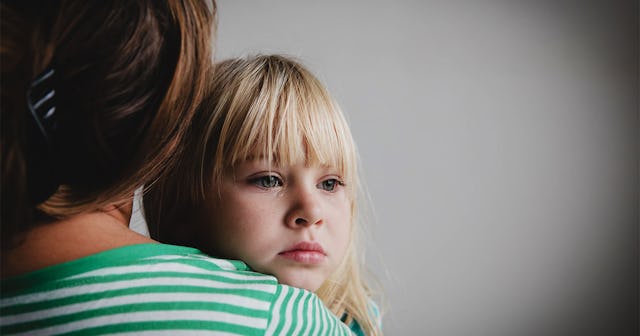Statistical Model Says 40,000 American Kids Have Lost A Parent To COVID

The number serves as a stark reminder of the staggering amount of loss due to COVID-19
From a sheer numbers perspective, the impact of COVID-19 on Americans has been hard to wrap our brains around. With close to 31 million cases in the U.S. and more than 555,000 deaths, it would be close to impossible to find someone who hasn’t been personally impacted by the virus.
An even more harrowing statistic: using a statistical model, it’s estimated that approximately 40,000 American kids have lost a parent due to COVID-19, undoubtedly leaving a gaping hole in the lives of each and every single one of the children who have experienced parental death as a result of the pandemic. That means for roughly every 13th COVID-related death, a child loses one parent, as cited by newly-released research provided by Penn State University.
Though many of the children who lost a parent were adolescents, about 25 percent were elementary-aged.
Researchers at the peer-reviewed journal JAMA: The Journal of the American Medical Association note the many ripple effects that can happen to children who lose a parent, including an increased risk of traumatic grief, depression, poor educational outcomes, and unintentional death or suicide. A sudden loss, such as one caused by COVID-19, can compound those effects, especially in a time of widespread social isolation, potential job loss and financial hardship, and other situational effects the pandemic has brought.
The JAMA data notes that Black children are disproportionately affected by these statistics, comprising 14 percent of U.S. children but with 20 percent of those losing a parent to COVID-19.
This disparity exists largely due to a lack of available access to healthcare, financial support, and parental support that families of color — particularly Black families — receive in the U.S.
Researchers note that “sweeping national reforms are needed to address the health, educational, and economic fallout affecting children,” including immediate, short-term and long-term support for children who have lost a parent due to the virus. As for what those reforms would actually look like on a national basis, Ashton Verdery, a professor of sociology, demography, and social data analytics at Penn State, said in a press release, “I think the first thing we need to do is to proactively connect all children to the available supports they are entitled to, like Social Security child survivor benefits — research shows only about half of eligible children are connected to these programs in normal circumstances, but that those who do fare much better. We should also consider expanding eligibility to these resources. Second, a national effort to identify and provide counseling and related resources to all children who lose a parent is vital.”
This data should serve as a stark reminder that each loss due to COVID-19 is a profound one, and that the pandemic isn’t over just because more Americans are receiving vaccines each day. Kids need just as much support as adults do during this time, especially if they’ve lost a parent or other family member to the virus.